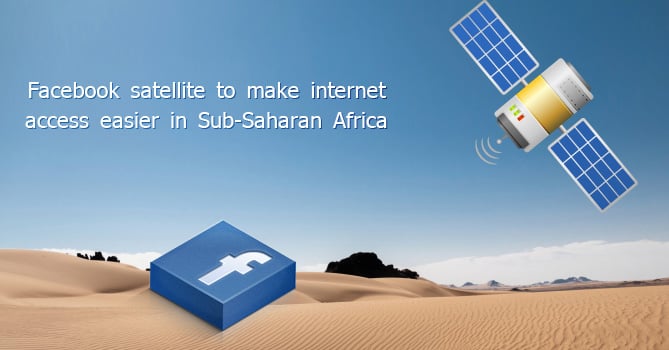Facebook will launch a satellite in partnership with Eutelsat Communications, an organization based in France, in order to make accessing internet easier in vast swathes of the region known as Sub-Saharan Africa. This satellite is a part of internet.org, a platform started by the social networking giant. Internet.org will look to provide greater access to internet through mobile devices. It is presently being constructed and it is supposed to be launched some time in 2016, probably in the second half. The satellite is supposed to be named AMOS-6. It will cover a lot of areas in three parts of Africa – south, west, and east.
Need for the technology
Mark Zuckerberg says that traditional infrastructure is not always effective or sufficient as far as connecting to people staying in the remote areas is concerned. This is why it is important to invest in fresh technologies. He has in fact stressed that Facebook will always make its best efforts to make sure people stay connected to each other and for that they would stop at nothing including looking outside Earth itself. Through the internet.org platform users will be able to gain access to web services that have been pared down.
This will include information on domains such as jobs, education, agriculture, and healthcare. One will also be able to use the messaging and social networking services operated by Facebook. According to the United Nations Broadband Commission in the last few years the growth in the amount of people who are able to use the internet is on the wane. It also states that till now at least 50% of the global population still does not have access to internet.
Facebook in Africa
During September, Facebook came out with statistics regarding its user base in Africa. It showed that there are almost 20 million people using Facebook in Africa. This includes prominent names such as Kenya and Nigeria. The same data has also showed that most of these users employ mobile devices in order to access Facebook, which is why the satellite will focus on these as well. In June, Facebook opened at Johannesburg, South Africa, its first ever office in Africa.
Together the two companies will be using internet services in order to cater to the demand for internet connectivity and services that has built up in the region for years. It needs to be noted in this context that as Zuckerberg has mentioned earlier, the existing terrestrial networks – both mobile and fixed – have proved to be insufficient in fulfilling this demand adequately and as a result this level of demand has built up. Already there are several service providers in the domain of satellite-based internet services.
However, the costs of availing these are pretty high and as a result majority of the people are not able to access them especially in the developing regions such as Africa. The CEO of Facebook has also said that his organization and Eutelsat will be working in association with the local service providers. Eutelsat, in fact, is already active in the wireless broadband network market of Sub-Saharan Africa. However, its services are sold only to enterprise users and not common people.
Reaction to the project
In spite of the evangelical nature of the said satellite, its parent project internet.org has not received a wholehearted welcome from all across the world. In fact, in some countries it has been severely criticized. In countries such as India, companies have been offended by the enterprise saying that it will provide Facebook and its partners undue advantage as far as developing markets for their web products and services was concerned.
Internet.org
This pet project of Facebook is presently aiming to provide internet to areas, where it is hard to access. The company is also looking to come up with customized drones that will help it to provide better connectivity to its intended beneficiaries. In fact, across 2014 Facebook has been looking at ways to use satellites and aircraft in order to make internet access easier. It has been revealed that till a few days back Facebook was trying to develop, start, and run its own satellite. However, owing to the increasing costs it had no option but to pull out of the same. It had, however, been toying with the possibility of leasing a satellite.
Eutelsat statement
In its statement on this project Eutelsat has said once the project becomes operational, the ground users will be able to access and use products on an off the shelf basis. It has said that this service is being created keeping the user community in mind. Access to internet will be available on a direct-to-user basis and the aforementioned equipment is going to be affordable according to the French company.
Commenting on the agreement, reached for several years, Michael de Rosen – the CEO – has said that the management is enthused at the prospect of being able to work with Facebook. It sees this as a chance to increase the speed at which its broadband strategy can be implemented across Africa.
Google balloons
Facebook’s initiative is not the only one of its kind. Previously in 2015, Google had said that it would start a program whereby balloons would be used to bring internet access to far-flung areas in Sri Lanka. This was to be done by making the balloons float at stratosphere.
Sources:
http://www.reuters.com/article/2015/10/06/us-facebook-satellite-idUSKCN0RZ2KE20151006
http://www.bbc.co.uk/news/technology-34451081
http://news.discovery.com/tech/gear-and-gadgets/facebooks-internet-satellites-to-launch-2016-151006.htm
